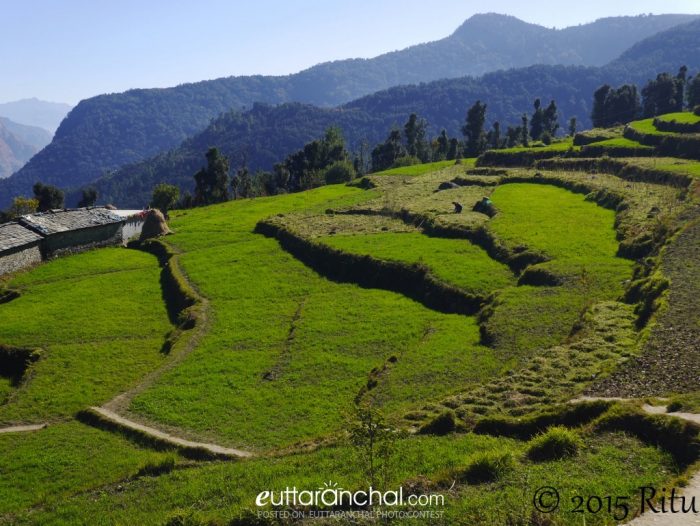
Organic farming practices in Uttarakhand Himalayas for centuries have been turning its back to all the ill-effects of agrochemicals on environmental and human health and is responsible for putting a healthy food in the plate of its consumers along with boosting clean and green environment. The state has enhanced organic activities in allied agricultural sectors like Horticulture, Medicinal Aromatic Plants and Herbs and animal husbandry within its boundaries.
In a video shared by Uttarakhand’s agricultural department, Bijendra Singh Rawat a farmer based at Kyarki village in Pauri, Uttarakhand, is seen saying, “I have a land of 2 hectares in my village in which I grow different vegetables by organic farming methods, apart from farming I also handle a poultry farm where I keep hybrid breeds of chicken.”
Praising the department, he adds, “Agriculture department in order to promote organic farming has provided us with various benefits such as water tanks, water sprinklers and farm machinery bank.”
What is organic farming?

According to International Federation of Organic Agriculture Movements (IFOAM), “Organic agriculture is a production system that sustains the health of soils, ecosystems and people. It relies on ecological processes, biodiversity and cycles adapted to local conditions, rather than the use of inputs with adverse effects. Organic agriculture combines tradition, innovation and science to benefit the shared environment and promote fair relationships and a good quality of life for all involved.”
Ill effects of the use of chemicals in agriculture?
Use of chemicals in farming come with a host of problems including health related diseases like cancer, pollution, degradation of soil and water, and impact on domestic animals.
Pre-existing advantages for organic farming in Uttarakhand

Despite population increase, the area under agricultural land use has not changed much over the past 30-40 years in Uttarakhand Himalayas as a result of socio-cultural restraints as well as legal ban on conversion of notified forests since 1890s, policies of supplying a quota of food grains at subsidized price, and promoting off-farm economy since 1970s.
Majority of the traditional settled upland agriculture is organic by default due to the lack of access to agrochemical and also poor crop response to chemical fertilizers in the widespread rainfed condition.
This Himalayan state is rich in the key inputs for sustaining organic farming, the hill region is rich in forest cover (64% of total area), the primary source of traditional farmyard manure (leaf litter and 50-70% of livestock feed available from forests) and water resources (upper catchment of the snow-fed Ganga and >1000 mm annual rainfall)
Bio villages promoting organic agriculture in Uttarakhand Himalayas

Srikot village in Pauri Garhwal is a minion village which has emerged as a surfeit bio-village. It all started with a project in which the farmers were educated about the harmful effects of the chemical fertilizers and the advantages of using biofertilizers. About 18 demonstrations were done on EM (Effective Microorganisms) Heap, BD Heap, CPP (Cow Pat Pit) and NADEP (a process to make compost) was also organized in Sirkot Village.
In 2001, a tiny hamlet called Dhanpur in Kalsi block of Dehradun district was identified as a bio-village. The village consumed a total of 146 quintals of D.A.P. (Diammonium phosphate) which they later reduced the use of chemical fertilizers to 10 quintals. Each household of this village now produces compost and bio-pesticide for their farmlands using cow urine.
The farmers of Mankandpur Village have been producing a different kind of compost called ‘Matka-Khad’, a vermin-compost which is beneficial for the crops.
Efforts towards promoting Organic farming in Uttarakhand

A great need was felt to constitute an organization to promote, coordinate, the dispersed organic activities and efforts for Organic Farming in the state. Thus, Uttarakhand Organic Commodity Board came in to existence on 19 May 2003.
On-going programs, many of which are funded externally presently provide the source for human resource for the technical and marketing activities. One of the largest programs in the Board is being funded by the Ratan Tata Trust, Mumbai by the name of Centre for Organic Farming (COF).
Interesting
sure I will try to get more, thanks for the suggestion
More details on the concerned Board and areas would be of great help to those wanting to enter into organic farming.
Great content! Super high-quality! Keep it up! :)